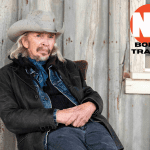Interview: Clarence Bucaro Talks “Walls of the World”
Clarence Bucaro doesn’t want to change the world – he just wants his listeners to know about some of the people who do.
That’s how his latest album “Walls of the World” was born. In 2009 Bucaro traveled to Jerusalem and was struck by the beauty of the old world city compared to the squalor found in the refugee camps of Ramallah and the West Bank.
“This one was much more observing rather than writing what was immediate,” said Bucaro of how the album came together. “Really [it took shape] over a year or two from the whole process of absorbing what I saw and doing tons of reading about the places and things I experienced.”
On the album, Bucaro sings about the universality of the Holy War and the political and personal overtones. His songs tell stories about everything from children on suicide missions to the class divide to two U.S. photographers killed in Libya to the birth of his son. He also makes parallels between the struggles in Jerusalem and those in other countries as highlighted by the Occupy movements.
“When I went there, I didn’t know much about the geography; it never made sense to me as an outsider,” he said. “When I went in and saw the refugee camps in Jerusalem, I was struck by the idea of people separated by physical and metaphorical walls…How children are used and driven to something unfathomable, obviously not making decisions from their own autonomy.”
Such sonic observations are nothing new to Bucaro. Throughout his musical journey, 
“In college I became interested in social movements and learned that music is as potent a weapon as any to speak to struggle and incite passion,” he said noting that he further his education by studying the Civil Rights and Labor Movements and delving into the music of Woodie Guthrie. That was soon followed by extensive travel.
“I think the original impetus was that I wanted to see the things my older brother saw,” he said. “He was always an inspiration to me. He is a very free spirit and I remember him coming home and talking more about [his travels] less as trips and more as journeys. I remember he’d come back and have his guitar and sing these songs.”
Not that it was always easy. Although Bucaro fantasized “over and over and over again” about being an artist, he was torn with a desire to become an environmental lawyer. He made the decision to become a musician when he hit something of a professional crossroads. At that time, he was offered a job on a natural resources defense council and a record deal.
“It just all happened really fast,” he said. “I could remember making the decision really quickly.”
Although Bucaro, whose mentors include Anders Osborne, seems to have no doubt he made the right decision.
“It took its form naturally,” he said. “I’m a free spirit and just wanted to do something creative.”




